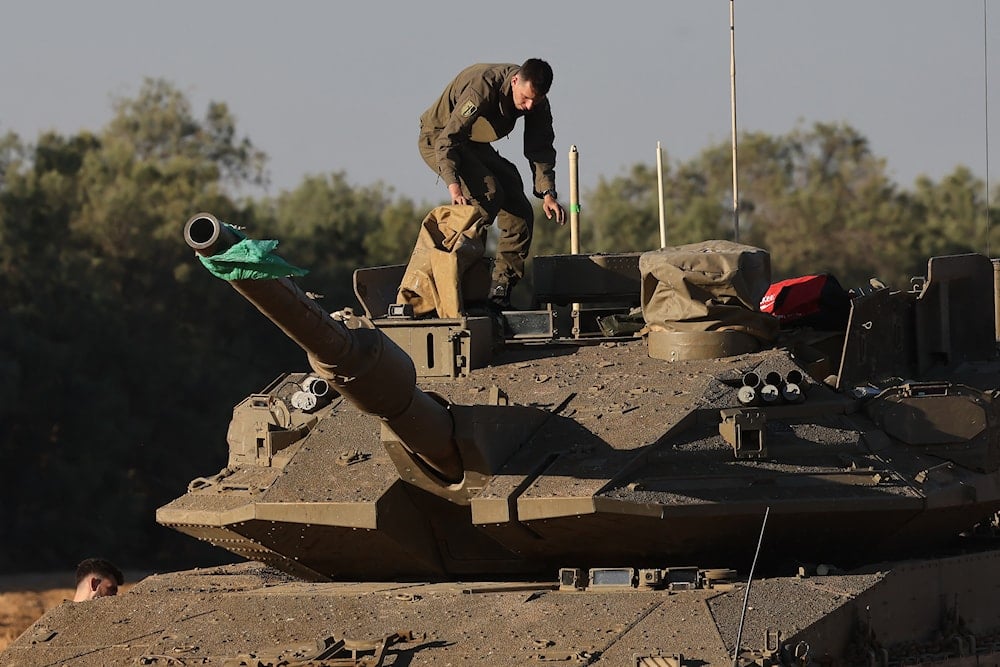Israeli military avoids calling up unwilling reservists: Haaretz
The Israeli military faces widespread refusal among reservists to engage in combat, with inflated compliance rates and urgent need to quadruple troop presence in Gaza.
-

An Israeli soldier prepares a tank at a position near the border with the Gaza Strip, on May 5, 2025. (AFP)
The Israeli occupation military has refrained from issuing call-up orders to reservists who have declared their refusal to participate in combat, out of concern that they would not comply with military instructions, the Israeli newspaper Haaretz reported, citing military sources.
The newspaper quoted Israeli military officers as saying that the rate of compliance with military service among reservists is low, highlighting that the officially announced figure of 80% does not reflect the actual situation.
Compliance rates inflated, say Israeli officers
One officer told Haaretz that the military has recently resorted to pressuring soldiers to engage in combat but is facing difficulties in mobilizing them for service.
The report also revealed manipulation in the published compliance rates, with both officers and soldiers confirming that the official figures do not accurately represent the true level of participation among reservists.
Israeli military faces fourfold troop shortage in Gaza
Security sources stressed to the newspaper that the Israeli military needs to increase its troop numbers fourfold in order to control key points in the Gaza Strip, amid mounting security challenges.
In recent days, the Israeli occupation military has warned that expanding military operations in the Gaza Strip could endanger the lives of Israeli captives, according to a report by the Israeli newspaper Haaretz.
"Israel's" military said expanded operations in Gaza would include displacing "most" of its residents after the security cabinet approved a plan that an Israeli official said will entail "the conquest of the Gaza Strip and the holding of the territories."
Field scenarios
Israeli security officials outlined a possible scenario for Cabinet members, suggesting that Hamas fighters could abandon the captives during an escalation in fighting as they are forced to withdraw from combat zones, increasing the risk of the captives' death or disappearance.
Military officials also warned that expanding ground operations would make it more difficult to deliver aid to the locations where captives are being held, thereby raising the likelihood of their death or permanent disappearance.
Fears of concealing bodies, difficulties in locating captives
Israeli media also reported that the security establishment is concerned Hamas might attempt to hide the bodies of captives in pits or concealed locations that would be difficult for the Israeli military or Shin Bet to locate.
In such a scenario, security officials warned that the bodies might never be found, especially if the Hamas fighters who know the captives' locations are killed in combat.
Read more: Hamas won, Israeli army faces collapse, retired Israeli general says
Political-military dispute over war objectives
The Haaretz report highlighted a clear dispute between the political leadership, which is focused on “achieving victory”, and the military leadership, which considers the retrieval of the captives the most important goal of the operations in Gaza.
Israeli military spokesperson Brigadier General Avi Dovrin told Haaretz that the military operates under the guidance of the political leadership, emphasizing that the objective is to retrieve the captives and topple Hamas rule.
Upcoming operation: 'Gideon’s Chariots' and delayed escalation until after Trump’s visit
The newspaper quoted a senior Israeli security official as saying that the decision to expand the fighting is tied to increasing pressure on Hamas to push it toward a prisoner exchange deal. He added that the expansion would not proceed until after US President Donald Trump's visit to the region.
The official confirmed that the operation, codenamed "Gideon’s Chariots", includes a plan to displace Gaza residents and that the resumption of humanitarian aid entry would only occur after the launch of the operation.
On his part, the Israeli military's Chief of Staff Eyal Zamir warned ministers that the operation could put the lives of the captives at risk.
Despite these warnings from the military leadership, the Security Cabinet unanimously decided on Monday to expand military operations in the Gaza Strip.
Also on Monday, families of the Israeli captives held in Gaza accused the government of sacrificing the remaining captives through the newly approved military escalation plan.
Read more: Al-Qassam ambushes 2 IOF units in Gaza, inflict heavy casualties

 4 Min Read
4 Min Read








